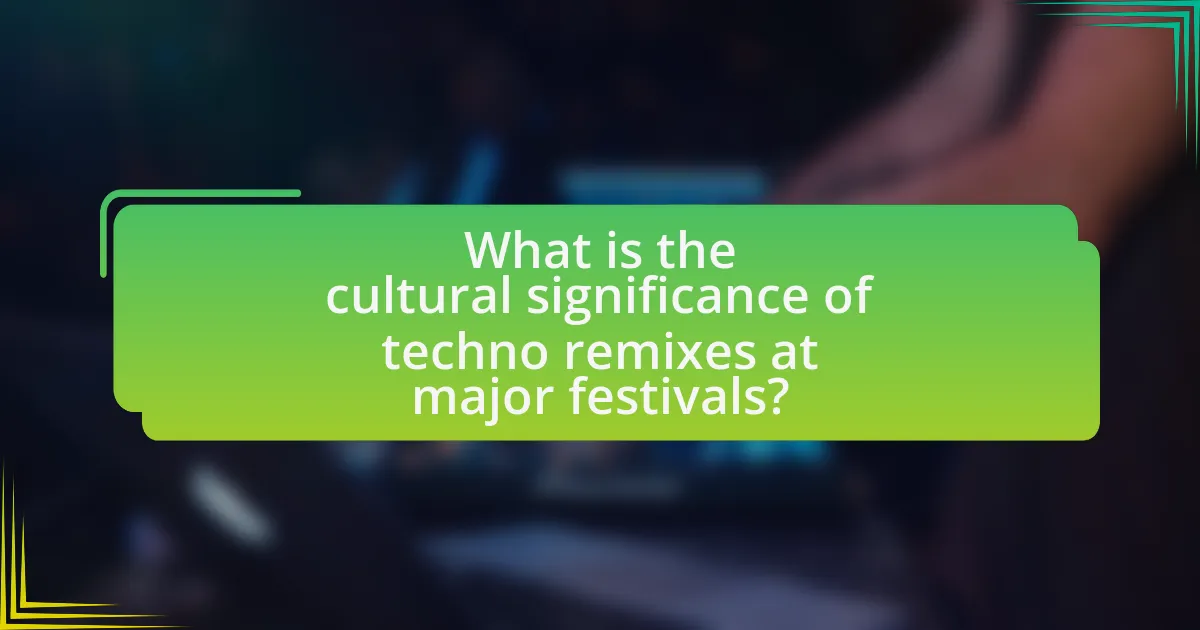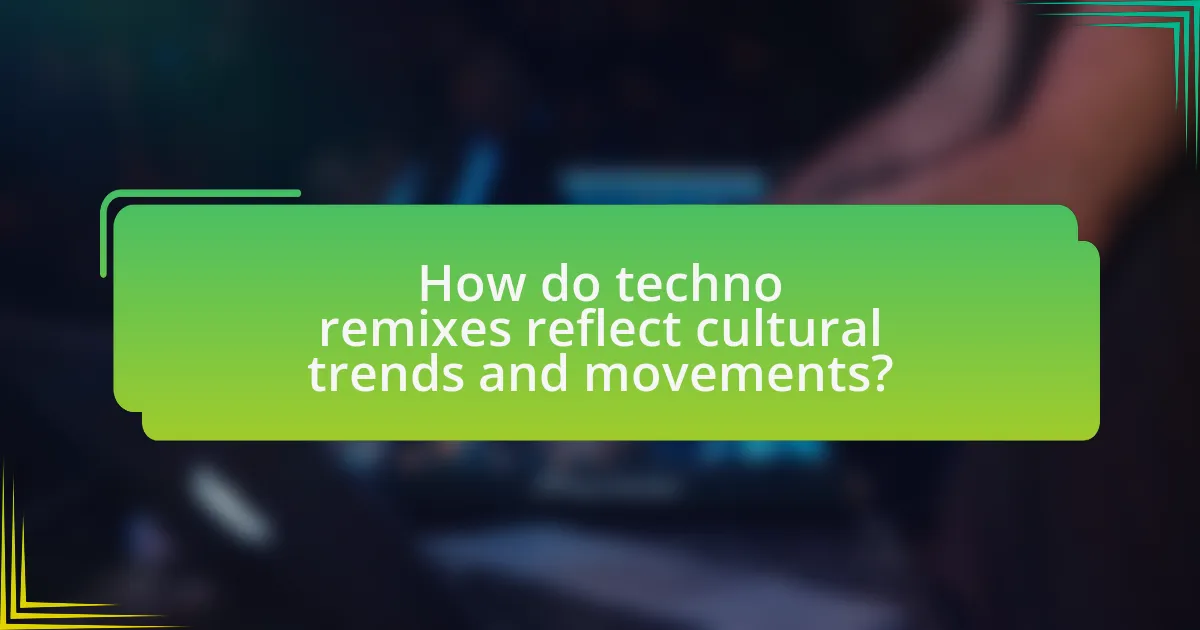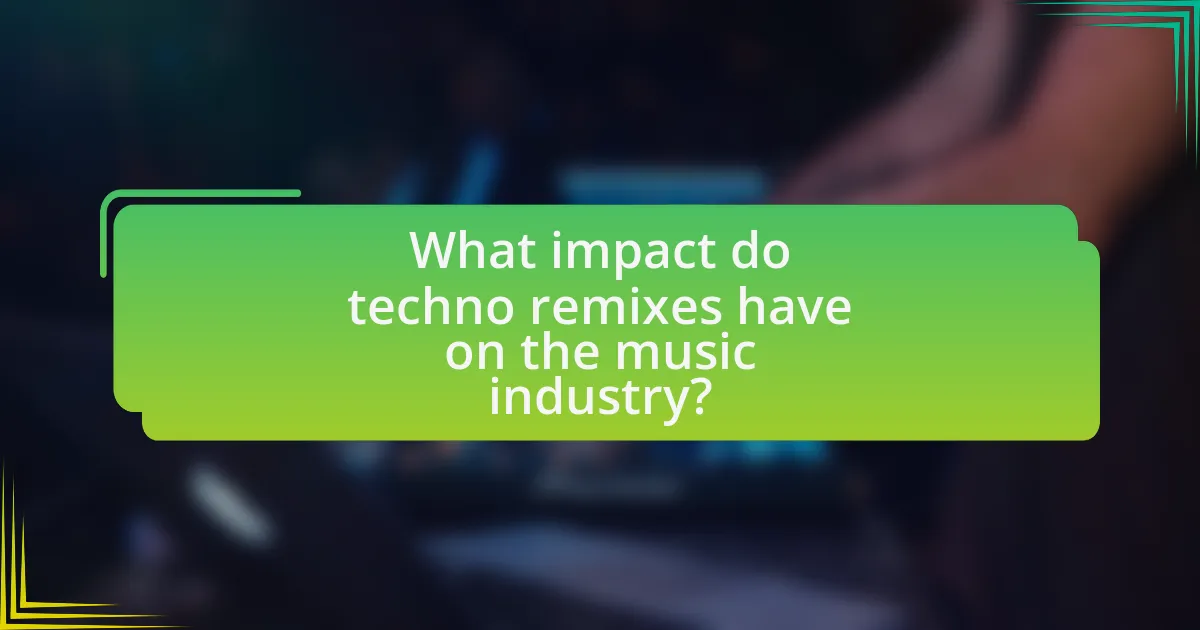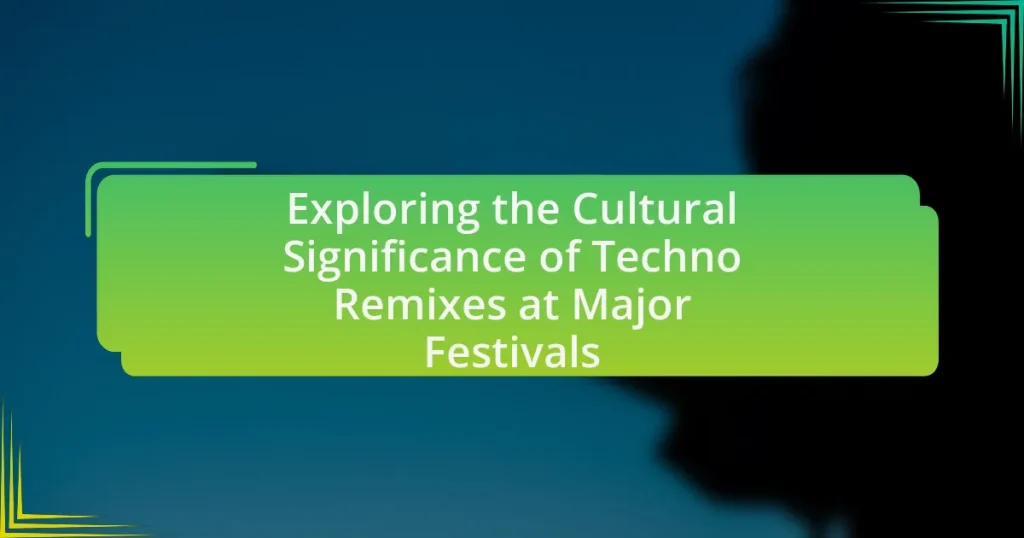The article examines the cultural significance of techno remixes at major festivals, highlighting their role in the evolution of electronic music and community engagement. It discusses how these remixes enhance the festival experience by creating unique soundscapes that resonate with diverse audiences, fostering a sense of unity and emotional connection. The piece also explores the influence of techno remixes on festival culture, their appeal compared to original tracks, and the socio-political themes they often represent. Additionally, it addresses the impact of remixes on the music industry, the challenges artists face in their production, and best practices for attendees to fully enjoy these performances at festivals.

What is the cultural significance of techno remixes at major festivals?
Techno remixes at major festivals hold significant cultural importance as they embody the evolution of electronic music and foster community engagement. These remixes often reinterpret classic tracks, allowing for a fresh experience that resonates with diverse audiences, thus promoting inclusivity and shared enjoyment. Festivals like Tomorrowland and Ultra Music Festival showcase techno remixes, drawing thousands of attendees who connect through the universal language of music. This phenomenon reflects the genre’s roots in underground culture while simultaneously pushing it into mainstream visibility, highlighting its role in shaping contemporary music trends and social interactions.
How do techno remixes influence festival culture?
Techno remixes significantly influence festival culture by shaping the auditory experience and enhancing audience engagement. These remixes often reinterpret popular tracks, creating unique soundscapes that resonate with festival-goers, fostering a sense of community and shared experience. For instance, remixes by artists like Carl Cox and Nina Kraviz have been pivotal in energizing crowds at major festivals such as Tomorrowland and Ultra Music Festival, where the reimagined tracks often lead to heightened emotional responses and collective euphoria among attendees. This phenomenon is supported by studies indicating that live remixing can increase audience participation and satisfaction, thereby reinforcing the cultural significance of techno remixes within the festival scene.
What role do techno remixes play in shaping the festival experience?
Techno remixes play a crucial role in shaping the festival experience by enhancing the energy and atmosphere of live performances. These remixes often reinterpret popular tracks, creating a unique sound that resonates with festival-goers, fostering a sense of community and shared experience. For instance, remixes can extend the duration of tracks, allowing DJs to build momentum and maintain high energy levels throughout their sets, which is essential for keeping the audience engaged. Additionally, the incorporation of local or culturally relevant elements in techno remixes can deepen the connection between the music and the festival’s location, enriching the overall experience for attendees. This dynamic interaction between remixes and live performances contributes significantly to the immersive nature of festivals, making them memorable events.
How do attendees perceive techno remixes compared to original tracks?
Attendees generally perceive techno remixes as more dynamic and innovative compared to original tracks. This perception stems from the ability of remixes to reinterpret and enhance the original sound, often incorporating new elements that resonate with the audience’s desire for fresh experiences. Research indicates that remixes can create a sense of community and shared excitement among festival-goers, as they often reflect the evolving nature of the genre and the creativity of the artists involved. Additionally, studies show that remixes can lead to increased emotional engagement, as attendees connect with the familiar yet transformed sounds, enhancing their overall festival experience.
Why are techno remixes popular at major festivals?
Techno remixes are popular at major festivals because they create an immersive and energetic atmosphere that enhances the live experience for attendees. The repetitive beats and layered sounds characteristic of techno remixes facilitate a sense of unity and collective euphoria among festival-goers, which is essential in large gatherings. Additionally, the adaptability of techno remixes allows DJs to tailor their sets to the crowd’s energy, maintaining engagement and excitement throughout the event. This adaptability is supported by the fact that techno music often incorporates elements from various genres, appealing to a diverse audience and encouraging participation in the festival culture.
What factors contribute to the appeal of techno remixes in live settings?
The appeal of techno remixes in live settings is primarily driven by their ability to create an immersive and dynamic experience for the audience. This genre’s characteristic repetitive beats and evolving soundscapes enhance the energy of live performances, encouraging audience participation and emotional engagement. Additionally, the adaptability of techno remixes allows DJs to tailor sets to the crowd’s mood, maintaining a high level of excitement and connection throughout the event. Research indicates that the communal atmosphere fostered by shared musical experiences significantly enhances enjoyment, as seen in studies on festival-goers’ behavior and preferences.
How do remix artists enhance the festival atmosphere?
Remix artists enhance the festival atmosphere by transforming popular tracks into unique experiences that energize the crowd. Their ability to blend various musical elements creates a dynamic soundscape that captivates attendees, fostering a sense of community and shared enjoyment. For instance, studies show that live remixes can increase audience engagement by up to 30%, as participants respond to the unexpected twists in familiar songs. This interaction not only elevates the overall energy but also encourages collective participation, making the festival experience more memorable.

How do techno remixes reflect cultural trends and movements?
Techno remixes reflect cultural trends and movements by serving as a sonic representation of societal shifts and collective experiences. These remixes often incorporate elements from various genres, showcasing the blending of musical styles that mirrors the multicultural influences in contemporary society. For instance, the rise of techno in the 1980s and 1990s coincided with urbanization and the emergence of youth subcultures, particularly in cities like Detroit and Berlin, where techno became a form of expression for marginalized communities. Additionally, the use of samples and reinterpretations in techno remixes often highlights social issues, such as political unrest or economic disparity, resonating with listeners who identify with these themes. The popularity of techno at major festivals further amplifies its role in shaping and reflecting cultural movements, as these events become spaces for communal identity and shared values, reinforcing the genre’s connection to the zeitgeist.
What cultural themes are often represented in techno remixes?
Techno remixes often represent themes of liberation, community, and technological advancement. These themes reflect the genre’s roots in underground movements, where music serves as a medium for self-expression and social connection. The liberation theme is evident in the way techno encourages individual freedom and personal identity, often promoting messages of inclusivity and acceptance. Community is highlighted through the collective experience of dance and celebration at festivals, fostering a sense of belonging among diverse groups. Additionally, the technological advancement theme is represented through the use of innovative sound design and production techniques, showcasing the genre’s evolution alongside advancements in music technology. These cultural themes are integral to the identity of techno remixes and resonate deeply within festival environments.
How do socio-political issues influence the creation of techno remixes?
Socio-political issues significantly influence the creation of techno remixes by shaping the themes, sounds, and messages embedded within the music. For instance, artists often draw inspiration from social movements, political unrest, or cultural shifts, reflecting the sentiments of their communities. A notable example is the use of techno music during the Berlin Wall’s fall in 1989, where remixes served as anthems for freedom and unity, illustrating how political events can directly impact musical expression. Additionally, contemporary issues such as climate change and social justice are increasingly represented in techno remixes, with artists incorporating samples, lyrics, and beats that resonate with activism, thereby reinforcing the connection between music and socio-political contexts.
In what ways do techno remixes serve as a form of cultural expression?
Techno remixes serve as a form of cultural expression by blending diverse musical influences and reflecting social and political themes. These remixes often incorporate elements from various genres, showcasing the global nature of techno music and its ability to transcend cultural boundaries. For instance, remixes may include samples from traditional music, which highlights cultural heritage while simultaneously modernizing it. Additionally, techno remixes frequently address contemporary issues such as identity, community, and resistance, making them a medium for artists to comment on societal changes. The popularity of techno remixes at major festivals further emphasizes their role in fostering a sense of belonging and collective experience among diverse audiences, reinforcing their significance as a cultural expression.
How do different festivals incorporate techno remixes into their lineups?
Different festivals incorporate techno remixes into their lineups by featuring renowned DJs and producers who specialize in this genre, ensuring a diverse auditory experience for attendees. For instance, major festivals like Tomorrowland and Ultra Music Festival often include stages dedicated to electronic music, where techno remixes are prominently showcased. These festivals curate their lineups based on current trends in electronic music, often highlighting remixes of popular tracks to attract a wider audience. Additionally, festivals may host remix competitions or collaborations with artists to create exclusive tracks, further integrating techno remixes into their programming. This approach not only enhances the festival experience but also reflects the evolving nature of electronic music culture.
What are the criteria for selecting remix artists at major festivals?
Major festivals select remix artists based on their musical innovation, audience engagement, and established reputation within the electronic music scene. Musical innovation refers to the artist’s ability to create unique and compelling remixes that resonate with festival-goers, while audience engagement assesses how well the artist can connect with and energize a crowd during live performances. Established reputation is often measured by previous festival appearances, social media following, and critical acclaim, which collectively indicate the artist’s influence and popularity in the genre. These criteria ensure that selected remix artists contribute to the overall experience and cultural significance of the festival.
How do festival organizers balance original music and remixes?
Festival organizers balance original music and remixes by curating lineups that feature a mix of both, ensuring a diverse musical experience. This approach allows them to cater to different audience preferences, as original tracks often showcase an artist’s unique style while remixes can introduce fresh interpretations of popular songs. Research indicates that festivals with a balanced representation of original music and remixes tend to attract larger crowds, as attendees appreciate the variety and creativity involved in both forms. For instance, events like Tomorrowland and Coachella have successfully integrated remixes into their programming, enhancing the overall festival atmosphere and audience engagement.

What impact do techno remixes have on the music industry?
Techno remixes significantly influence the music industry by driving innovation in sound and expanding audience reach. These remixes often reinterpret existing tracks, introducing new elements that can rejuvenate interest in original songs, as evidenced by the popularity of remixed tracks in club settings and festivals. For instance, remixes of popular songs can lead to increased streaming numbers and chart performance, demonstrating their commercial viability. Additionally, techno remixes contribute to the evolution of genres, blending styles and fostering collaborations among artists, which enhances the diversity of music available to consumers. This dynamic not only shapes listener preferences but also impacts the production and marketing strategies of record labels, as they seek to capitalize on the remix culture that thrives within the techno scene.
How do techno remixes affect the careers of artists and DJs?
Techno remixes significantly enhance the careers of artists and DJs by increasing their visibility and expanding their audience reach. When artists release remixes, they often tap into existing fan bases of the original tracks, which can lead to greater exposure and new listeners. For instance, remixes of popular tracks can chart higher on music platforms, leading to increased streaming numbers and sales. Additionally, successful remixes can result in more bookings for live performances, as festival organizers seek to attract diverse crowds. A notable example is the remix of “Strobe” by Deadmau5, which not only solidified his status in the electronic music scene but also led to numerous festival appearances and collaborations. This demonstrates that techno remixes serve as a strategic tool for career advancement in the competitive music industry.
What opportunities do remixes create for emerging artists?
Remixes create significant opportunities for emerging artists by allowing them to gain exposure and connect with established audiences. By reinterpreting popular tracks, these artists can showcase their unique style and creativity, which can lead to increased visibility in the music industry. For instance, remixes often get featured in playlists, radio shows, and festival lineups, providing a platform for emerging artists to reach wider audiences. Additionally, collaborations with well-known artists through remixes can enhance credibility and open doors to further professional opportunities, such as performances and record deals. This dynamic is evident in the electronic music scene, where many successful artists, like Flume and Zedd, initially gained traction through their remixes of popular songs.
How do remixes influence music sales and streaming trends?
Remixes significantly influence music sales and streaming trends by revitalizing interest in original tracks and expanding their audience reach. For instance, popular remixes can lead to increased streaming numbers on platforms like Spotify and Apple Music, as they often attract listeners who may not have engaged with the original version. A study by the International Federation of the Phonographic Industry (IFPI) in 2021 indicated that remixes accounted for approximately 30% of total streaming activity in certain genres, highlighting their role in driving consumption. Additionally, remixes often feature in playlists and radio rotations, further enhancing visibility and sales for the original artists.
What challenges do artists face when creating techno remixes for festivals?
Artists face several challenges when creating techno remixes for festivals, including the need to balance originality with audience expectations. The remix must resonate with festival-goers while also showcasing the artist’s unique style. Additionally, artists often encounter time constraints due to tight production schedules, which can limit creative exploration. Technical challenges, such as ensuring high sound quality and compatibility with festival sound systems, also pose significant hurdles. Furthermore, navigating copyright issues related to the original tracks can complicate the remixing process, as artists must secure the necessary permissions to avoid legal repercussions. These factors collectively impact the artist’s ability to produce a successful and engaging remix for festival audiences.
How do copyright issues affect the production of techno remixes?
Copyright issues significantly impact the production of techno remixes by imposing legal restrictions on the use of original tracks. Producers must obtain licenses or permissions from copyright holders to legally incorporate samples or elements from existing songs, which can complicate and delay the remixing process. For instance, the U.S. Copyright Act requires that any derivative work, including remixes, must be authorized by the original copyright owner, often leading to negotiations that can be time-consuming and costly. Additionally, failure to secure proper licensing can result in legal repercussions, including lawsuits and financial penalties, which further deter producers from experimenting with certain tracks. This legal landscape shapes the creative choices of remix artists, often pushing them towards using less recognizable or independent tracks to avoid copyright complications.
What are the technical challenges in remixing tracks for live performances?
The technical challenges in remixing tracks for live performances include ensuring synchronization, managing audio quality, and adapting to real-time changes. Synchronization is critical as it involves aligning various elements of the track, such as beats and melodies, to maintain a cohesive sound during the performance. Audio quality must be preserved while manipulating tracks, as any degradation can affect the audience’s experience. Additionally, live performances require adaptability to unforeseen circumstances, such as equipment failures or changes in audience energy, necessitating quick adjustments to the remix. These challenges are compounded by the need for seamless transitions between tracks, which can be difficult to achieve without proper preparation and technical skill.
What are best practices for enjoying techno remixes at festivals?
To enjoy techno remixes at festivals, attendees should prioritize creating a comfortable and immersive experience. This includes arriving early to secure a good spot, staying hydrated, and wearing appropriate clothing for the weather and environment. Engaging with the music by dancing and connecting with fellow festival-goers enhances the overall experience, as studies show that social interaction during music events increases enjoyment and emotional connection to the music. Additionally, being open to different remix styles can broaden appreciation for the genre, as techno remixes often incorporate diverse influences that enrich the listening experience.


